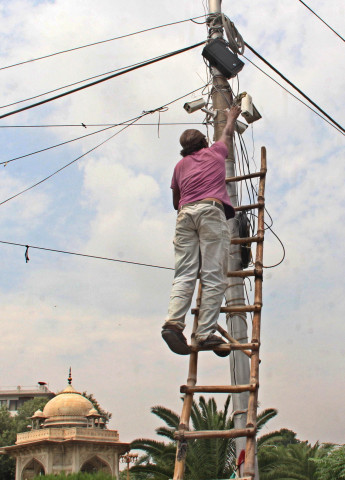Is better surveillance key to security?
Peshawar has 132 security cameras, 32 security checkpoints but safety remains major concern

Security today is not just associated with a particular segment of society or organisation. PHOTO: EXPRESS
The problem is that it takes just single incident of violence to disturb the peace or even undermine the entire process of securitisation. There is also the ever-present argument that if the situation itself is volatile, why does an assumption exist among certain circles that all is well?
In a recent incident, a specific community of the city felt threatened and demanded more cameras installed in the city.
Questions arose that if the police managed to get the resources to install CCTV cameras in specific parts of the city for Muharram, why could this not be done on a permanent basis?
While the entire project cost Rs7.2 million, it was impossible for the police to implement. However, a common ground was reached and a solution found through a joint venture between the private sector and the government.

Whether the initiative can guarantee security for the community is another matter altogether.
After the recent Mardan district courts suicide attack which killed 13 people and injured another 54, 105 policemen deployed were at the judicial complex in Peshawar. However, there was also a triple-layered security mechanism in Mardan.
What is at stake here is the mutual trust between the individual and the state.
While visibly traditional mechanisms might bring a sense of security, within them lies the Shakespearian prognosis of “Something’s rotten in the State of Denmark.”
While violence grips the urban sphere and terrorism is no longer a phenomenon associated with mountains which many never saw, there is a dire need for an effective mechanism to provide security by building trust.
The question of what shape this mechanism will take can have many answers as several experts are involved.
The one certainty is that measures must be all-inclusive. For the right to public spaces in a conflict-ridden zone, it is crucial for individuals to take responsibility for those very spaces. Security today is not just associated with a particular segment of society or organisation.
In a world where global peace is falling apart, only those countries that stick together and work for peace will overcome tougher times.
The solution is far from simple and a column is not enough space to discuss such a vast topic because of the intricacies involved. However, it is important to open up a discussion on what security actually means in today’s Peshawar and measures that will make people feel safer.
Published in The Express Tribune, September 7th, 2016.













COMMENTS
Comments are moderated and generally will be posted if they are on-topic and not abusive.
For more information, please see our Comments FAQ